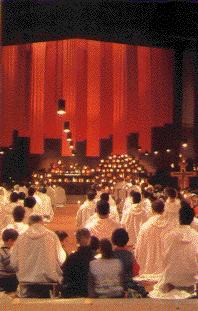 I am embarrassed to tell you how rich I am, based on my salary. Have you ever thought about how rich you are? If you are reading this blog via your own computer, you are rich. Click here to go to a little website that will show you what percentile you are in on a global scale in terms of wealth.
I am embarrassed to tell you how rich I am, based on my salary. Have you ever thought about how rich you are? If you are reading this blog via your own computer, you are rich. Click here to go to a little website that will show you what percentile you are in on a global scale in terms of wealth. I used to say "I'm not rich." But that all changed one day in the marketplace of Chichicastenengo, Guatemala. I was with a group of seminarians, and we were being targeted by the trinket sellers. I suppose we looked a tad bit gringo-ish. But, knowing that we were going to the market, I was ready to buy a few things and then hit my limit and stop. I practiced saying "Tengo no dinero" (I have no money) so that I could tell the merchants that they would have no luck with me this day!
The very first time I tried that line, I was speaking with a beautiful young woman with long dark hair dressed in a wonderfully brightly colored outfit, and holding a tray full of little dolls. I smiled at her and confidently said, "Tengo no dinero." Returning my smile and not missing a beat she looked right at me and in wisdom and in truth said, "Yes, you have money. You are American."
And she was right. I may not have had cash, but I was carrying a camera worth several hundred dollars and if I could have popped into a bank I could have walked out with as much cash as I needed via that deadly little piece of plastic in my wallet. Not to mention the fact that any of a dozen relatives were just a phone call and a Western Union wire away from hooking me up with whatever financial assistance I might need at a moment's notice. Yes, she was right, I had money.
Truth is, I am filthy rich when compared to the world. The standards are all out of whack when you are thinking globally. My family lives in a three story, four bedroom, three and a half bathroom home in a suburban neighborhood. Families three times bigger than mine live in one room houses that a U.S. citizen would call a "hut" or even a "shack." But my huge house is not even close to the size of some of the castles around here. And some of those homes have two or three people rattling around in them.
The typical response to laments like this goes like, "Thank God you are blessed enough to live in a country where the standard of living is such that ... blah, blah, blah. Our free market system makes it possible for you to live like ... yadda, yadda, yadda. You should be happy to be living in a democracy where you are free to get a job that ... etcetera, etcetera, etcetera." And to this response, I say a meager, ambivalent, "Yes, but ..."
My "yes, but" comes from hearing something about mountains and hills being made low, while every valley is lifted up. I seem to remember something about a certain group of people sharing everything one with another, as each had need. I may have read somewhere about taking care of widows, orphans, those who are poor, hungry, naked, homeless, or sick. I'm pretty sure I've read that stuff somwhere before. Now, hmm ... let me think about it. Where did I read that again? Must have been a pretty good book ...
According to this Global Rich List website, I'm in the top .753% of the wealthiest people in the world. And believe me, I am so grateful that my family has enough to eat, a place to live, and clothes to wear. I am extra grateful for a few amenities like this computer, toys for my kids, two functioning cars, and all that stuff piled in the storeroom that we don't need anymore and need to have a garage sale soon to get rid of. But there are 5,954,802,035 people in the world who are poorer than I am. What is my Christian moral responsibility in light of that reality?
$tuck, Andy B.








